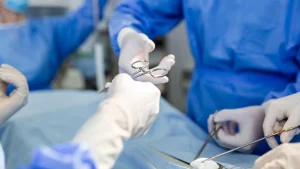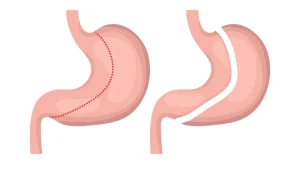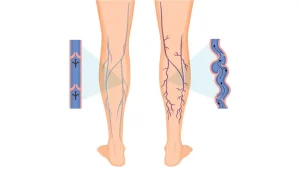Gastric Band Surgery

Overview
Gastric band surgery is a safe and effective weight loss surgery option for individuals with a BMI of 30 or higher, who have been unable to achieve results through traditional methods such as diet and exercise.
The procedure involves placing an adjustable band around the upper part of the stomach to create a small pouch, which helps patients feel full more quickly and consume fewer calories.
Dr Ankit Potdar specialises in gastric band surgery and are committed to providing personalised treatment plans tailored to meet each individual’s unique needs and goals.
Our comprehensive approach includes pre-operative counseling, dietary guidance throughout recovery, regular follow-up appointments for tracking progress & results, as well as careful monitoring of post-surgery care.
If you’re considering gastric band surgery as a solution to your weight loss struggles, explore our webpage today to learn more about how this procedure can help you achieve successful long-term results and improve your overall health & wellbeing.
Everything You Need To Know Gastric Band Surgery
What is Gastric Band Surgery
Gastric band surgery is a minimally-invasive weight loss surgery option that involves placing an adjustable band around the upper part of the stomach to create a small pouch. This helps patients feel full quicker and consume fewer calories, thereby facilitating successful long-term weight loss over time.
How It Works
The procedure is designed to help those with BMI of 30 or higher, who have been unable to achieve desired results through traditional methods such as diet and exercise. It requires only a small incision and can often be performed on an outpatient basis, with minimal recovery time needed.
Generally, it takes about 45 minutes for the surgeon to place the gastric band in position. After surgery, the plastic tubing connecting the band to an access port placed under the skin is adjusted periodically by adding or removing saline solution in order to alter the size of the outlet created by the gastric band.
Brief Overview of Procedure
Gastric band surgery is a minimally-invasive procedure that involves placing an adjustable band around the upper part of the stomach to create a small pouch. It requires only a small incision and can often be performed on an outpatient basis, with minimal recovery time needed. Generally, it takes about 45 minutes for the surgeon to place the gastric band in position.
Benefits of Gastric Band Surgery
The key benefits of gastric band surgery include improved health outcomes (as weight-related conditions are alleviated), significant reduction in BMI in a short period of time, and improved body image leading to increased confidence. This procedure offers a safe and effective way to achieve successful long-term weight loss results and improved overall health & wellbeing.
When Gastric Band is suggested over other types of bariatric surgeries?
Gastric band surgery is typically recommended when a person is not severely overweight or obese and they are looking for a safe and effective way to lose weight that also offers long-term results. Because this procedure doesn’t involve any cutting or stapling, it’s an attractive option since the procedure is minimally invasive and there are less risks involved.
Gastric banding is also recommended for those who want flexibility in controlling their weight loss due to the adjustable nature of the band.
Eligibility for Gastric Band Surgery
Eligibility for gastric band surgery is based on a variety of factors, including:
- Body Mass Index (BMI): Generally, a patient must have a BMI of 40 or more to qualify for the procedure. However, individuals with a BMI of 30-35 may also be eligible if they have weight-related health conditions such as type 2 diabetes or certain heart issues.
- Age: The minimum age for this procedure is 18 years old and there is no upper limit for eligibility.
- Willingness to Adjust Diet & Exercise Habits: Candidates must be willing to make lifestyle changes prior and after the surgery in order to get the best results from the procedure.
Factors that may disqualify a patient from gastric band surgery include:
- Recent Surgery: Patients should not have any major surgeries within the past 6 months prior to surgery.
- Active Infection: Patients who suffer from an active infection at the time of surgery will usually not qualify for gastric banding.
- Previous Weight Loss Surgery History: If a person has undergone weight loss surgery before and failed due to inadequate follow through or other reasons, they may not be eligible for the procedure.
The evaluation process prior to gastric banding includes an initial consultation with a bariatric specialist where patients will go over their medical history and discuss their goals related to weight loss. After this consultation, tests such as blood work & imaging studies may need to be done in order to determine if the patient meets all necessary criteria and qualifies for the procedure.
Procedure
The process of gastric banding involves placing an adjustable silicone band around the upper part of the stomach to create a small pocket. This pocket limits the amount of food that can be consumed and requires chewed food to pass through more slowly. As a result, individuals feel full sooner and satiety is achieved after consuming less food.
There are currently two types of gastric band devices available:
- Lap Band: The laparoscopic adjustable gastric band (or “Lap-Band”) is placed using an endoscope, a thin tube with a camera on it which is inserted into the abdomen through small incisions in order to place the device without having to do any cutting or stapling.
- Realize Band: The Realize Band is a newer type of adjustable gastric band device with similar capabilities as the Lap-Band. It also uses an endoscope for placement and offers enhanced communication between patient & physician during weight loss consultations.
Gastric band surgery differs from other bariatric surgeries such as gastric bypass or sleeve gastrectomy in that it does not involve any cutting or stapling. Additionally, because the procedure is minimally invasive and reversible, patients have more flexibility when it comes to controlling their weight loss due to the adjustable nature of the band.
Recovery and Aftercare
After gastric banding surgery, patients usually have a recovery period of 2-4 weeks before they’re able to return to their normal activities. During this time, it’s important for individuals to rest and follow the post-operative care guidelines provided by the surgeon. This typically includes eating soft foods such as yogurt or mashed potatoes for the first week and then slowly transitioning to solids over the next two weeks.
Post-operative care should also include regular follow-up visits with a bariatric specialist who can adjust the band as needed and monitor any potential complications. Regular diet and exercise is also essential for successful weight loss following this procedure. Patients should be encouraged to eat smaller meals more frequently throughout the day, avoid unhealthy snacks & drinks, limit saturated fats & sugary foods, and be active for at least 30 minutes each day.
Long-term maintenance is key when it comes to gastric banding surgery. Patients should continue their regular follow up visits in order to make sure that the band is adjusted appropriately based on their weight loss progress & goals. Additionally, they should also be aware of potential complications such as infection or erosion of the device which may require additional medical attention or replacement of the band itself.
Cost of Gastric Band and Insurance In India
The cost of gastric band surgery in India can vary greatly depending on the type of hospital, doctor and additional services included. On average, the cost of the procedure itself is around ₹1.5 to 3 lakh in Mumbai.
Insurance coverage for gastric band surgery varies from one company to another. Most insurance companies require that patients meet certain criteria such as a body mass index (BMI) above 35 and/or completion of a medically-supervised weight loss program before they will cover the cost. Additionally, some companies may also require that gastric banding be done at specific hospitals or by specific doctors in order to be covered.
Frequently Asked Questions about Gallstone Surgery
-
How much weight can I expect to lose with gastric band surgery?
Gastric banding is considered a safe and effective form of weight loss surgery that can help individuals to lose up to 40-50% of their excess body weight.
-
Am I a good candidate for gastric band surgery?
Good candidates for gastric band surgery typically have a BMI of 40 or more, although some patients with lower BMIs may also be eligible if they have related medical conditions such as diabetes or heart disease. Your doctor will be able to evaluate your individual situation and provide advice on whether you are an appropriate candidate for the procedure.
-
How long does gastric band surgery take?
Gastric band surgery usually takes between 1-2 hours to complete.
-
How often will I need to see my doctor after the surgery?
Individuals who undergo gastric banding typically need follow up visits with their doctor every 3-4 months in order to check the device and make any necessary adjustments. These visits will also include nutritional counseling and support for long-term lifestyle changes that support successful weight loss.
-
Can the gastric band be adjusted or removed if necessary?
Both adjustments and/or removal of the gastric band are possible if needed. Adjustments can be made by injecting additional saline into the port which tightens the grip around the stomach, while removal simply involves snipping off the tube connecting the port to the rest of the device.
-
What are the risks and potential complications of gastric band surgery?
The risks associated with this type of bariatric procedure include infection, nausea & vomiting, GERD (gastroesophageal reflux), erosion/leaking of device components, obstruction, slippage of the device, bleeding & numbness where incisions were made, inadequate weightloss and/or regain of lost weight. Talk to your physician about any specific concerns that you might have before undergoing this procedure.
-
Will I be able to exercise after the surgery?
Yes! Regular exercise is essential for successful long-term outcomes following bariatric procedures such as gastric bands. Most doctors recommend moderate activity at least 30 minutes per day in order to aid in achieving desired weight loss goals as well as maintaining overall health & wellness post-surgery.
-
How long does the gastric band typically last?
Gastric bands typically last between 5-10 years depending on a variety of factors such as age & diet habits. If necessary, it’s possible for them to be adjusted or replaced over time in order to continue achieving desired results.
-
How long does it take to see results after gastric band surgery?
Results will depend upon how consistently individuals adhere to dietary guidelines & attend followup visits; however most people can expect gradual steady weight loss starting at 6 months post-surgery with maximum results occurring 18 – 24 months following implementation.
Brief Overview of Procedure
Gastric band surgery is a minimally-invasive procedure that involves placing an adjustable band around the upper part of the stomach to create a small pouch. It requires only a small incision and can often be performed on an outpatient basis, with minimal recovery time needed. Generally, it takes about 45 minutes for the surgeon to place the gastric band in position.
Our Services
Pancreatic Cancer
Pancreatic cancer is a type of cancer that affects the pancreas – an organ located in the abdomen
Colon Cancer / Colorectal Cancer Surgery
Colon cancer is a serious and potentially life-threatening disease.
Hernia Laparoscopic Surgery
A hernia is the protrusion of an organ or tissue through a weak or damaged area in the abdominal wall
Piles Surgery
Piles, also known as hemorrhoids, are swollen veins in the anal and rectal area.
Appendix Surgery
Pain or discomfort in your abdomen, it is possible that you may have appendicitis.
Fistula Surgery
A fistula is an abnormal connection between two organs or tissues that can lead to complications.
Gallstone Surgery
Gallstone Surgery is a minimally invasive procedure to remove gallstones.
Gastric Band Surgery
Gastric Band Surgery is a safe, non-invasive bariatric procedure that helps you lose weight quickly and safely
Gastric Bypass Surgery
Gastric Bypass Surgery is a minimally invasive procedure that can help you to achieve your weight loss dreams.
Gastric Sleeve Surgery
Gastric sleeve surgery, an effective and popular procedure for achieving significant weight loss.
Varicose Veins
Varicose veins are enlarged, twisted and swollen veins that occur mainly in the lower legs and feet.

PROFILE
About Dr. Ankit Potdar
Dr. Ankit Potdar is one of the best laparoscopic surgeon in Mumbai, India. He has extensive knowledge and training in advanced laparoscopic and robotic surgery, and is known for his precision, expertise, and compassionate approach to patient care.
He is an expert in general, oncological, advanced laparoscopic GI surgery, Thoracic and Esophageal surgery. He is currently associated with SRV Hospital, Goregaon West and Chembur Mumbai.
He has extensive experience in performing minimally invasive surgeries for various conditions, including gastrointestinal diseases, obesity, hernias, and gallbladder problems.
Patient Treated By Dr. Ankit Potdar
People heavily rely on reviews from other patients when choosing a healthcare provider
Dr. Ankit has done my Brother Harnia Surgery. It went well and my brother recovered so fast. Really good Dr. .Explained every precautions and give full assistance in the follow-up as well.. Thank you Dr. Ankit
Best doctor i ever met. Friendly type nature, my umbilical hernia surgery was done by dr ankit poddar and always recving my calls reply by late nights also ...
Dr Ankit Potdar is a gem of a person. I have been operated for ovarian cancer under his care and we are very satisfied with the treatment received. Doctor is very honest and straightforward and also helped us with the treatment protocol post surgery.
Patient Knowledge Center -Blogs
Blogs
Symptoms of Gallbladder Stones ?
Dr. Ankit Potdar, a renowned gallbladder surgeon in Chembur, specializes in treating gallbladder stones. Learn about symptoms and treatme...
Advantages of Laparoscopic Surgery for Hernia Repair
Transforming Hernia Repair: Meet Dr. Ankit Potdar, Mumbai’s Laparoscopy Expert! Uncover the Benefits of Minimally Invasive Surgery ...
Effective Methods for Gallbladder Stone Relief
Gallbladder stones, also known as gallstones, are a common medical condition affecting millions worldwide. These hardened deposits can ca...














